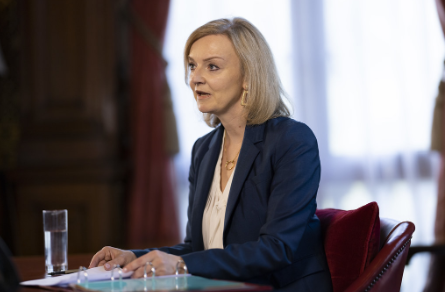Prime Minister Liz Truss resigns
The Prime Minister of the UK has resigned after disastrous tax cuts that caused inflation.

Prime Minister Liz Truss announced that she will resign after a series of controversies.
November 9, 2022
UK Prime Minister Liz Truss announced on Thursday that she will resign from office. Her 44-day term as Prime Minister will be the shortest in UK history.
Truss’ resignation was sudden, but not unexpected. Her failed tax-cutting budget caused economic turmoil in the UK, sending fellow Conservative Party leaders into a panic under her administration.
Truss’ tax cuts for the wealthy caused heavy division in her party, inciting heated debate over how her policies should be carried out. Much of the legislation Truss passed has been reversed, causing prominent conservative leaders such as Rishi Sunak to openly criticize her.
Graham Brady, the leader in charge of prime minister reshuffles and leadership selection, talked with Truss in a meeting last week. Though the meeting was only one hour, 17 conservative representatives already put a vote of no confidence in Truss, despite her desire to stay in office. This vote was the final push towards her resignation.
Truss’ resignation hasn’t been especially unpopular – during her administration, the price of the pound rose 0.6%, an unprecedented economic catastrophe credited to her radical policies. She has the lowest popularity rating of any British prime minister in UK history.
There were two main causes for Truss’ resignation: one, her disastrous tax cuts for the wealthy, and two, her sudden spree of firing ministers.
The radical tax cut responsible for much of Truss’ downfall originated when she and Kwasi Kwarteng, a conservative member of parliament, formulated a plan based on trickle-down economics that would favor the rich and lower taxes. The result was unprecedented inflation that instantly destroyed Truss’ popularity.
Truss’ firing spree also accounted for part of her resignation – in just her first week, Truss fired three senior ministers: her close ally Kwarteng, Home Secretary Suella Braverman, and top aide Jason Stein. Unfortunately for Truss, these sweeping reforms within her cabinet weren’t enough to prevent economic failure under her ministry.
Many conservatives are calling for the reinstatement of Boris Johnson – the Prime Minister who preceded Truss – who resigned due to a scandal related to the COVID-19 pandemic. Many have pointed out that Johnson was far more successful in handling conservative policies, despite his controversial failure to follow COVID-19 restrictions in early 2020 and several sexual assault allegations made against him.
Others are vouching for Rishi Sunak to take over, the former Chief Secretary of the Treasury who gained very popular support among conservatives throughout his administration. Sunak is seen as a “safe pair of fiscal hands” by many, as he successfully steered the UK through the COVID-19 economic crisis in 2020.
The timing for when Truss’ replacement will be announced is unknown; at the moment, most foresee Sunak taking her position if he accepts. The next election – where citizens will decide whether the conservative party’s choice of Truss’ replacement will stay as Prime Minister – is currently set for May 2024.


